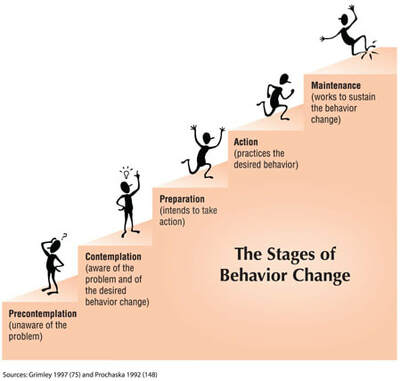
In therapy, change is seen as a process. The Transtheoretical Model (TTM) (Prochaska & Diclemente, 1983) is a 5-stage model that presents change as a biopsychosocial model. Meaning, change includes an individual’s biological makeup, psychological experiences, and social/environmental factors. The TTM introduces the process of intentional behavioral change. This is a process that unfolds over time, but the process is not always linear. Individuals may recycle through the stages or regress through the stages.
It means that therapy is helpful to assist clients with positive behavioral change; however, the rate of noticeable change will depend on the stage you are currently in. During therapy, I work with clients at all stages of change. It is imperative to know which stage the client is currently. The therapist should meet the client where they are in the change process, instead of pushing the client when he/she isn’t ready.
Note: time in each stage is variable and dependent on the individual.
| Precontemplation – individual not ready for change and unaware change is needed | How do you know if you are ready to change? Each stage requires the following principals to help reduce resistance, facilitate progress, and prevent relapse. | Client in Precontemplation Stage -- This client attends therapy regularly to complain about all the issues other people have. She is often angry and frustrated. She usually rambles from one topic to the next. She response defensively when she is asked about how her actions contribute to the issues. This client dismisses suggestions from the therapist. |
| Preparation – individual is ready for change and plans to take action | Client in Preparation Stage – This client is motivated for change and embraces counseling: skill building, homework for practice, goal creation (i.e. being assertive, finding work-life balance, maintaining self-respect, stress management, anger management, improving relationships), and planning action steps. She regularly works to complete action steps and responds well to encouragement to continue to reach her goal. |
| Action – individual makes specific, overt modifications to practice the desired change | Self-Efficacy: One’s belief in own ability to succeed in a specific situation or to accomplish a task | Client in Action Stage – This client has effectively used assertive communication skills, conflict resolution, and problem-solving skills for months. One day, outside of a counseling session, she spoke clearly and assertively in the moment. The other person noticed the change and respected her boundaries. She was flooded with feelings of pride and a sense of accomplishment and growth. Validated by the positive outcome of change in action, she felt an increased desire to continue utilizing her skills for positive change. |
| Maintenance – individual continually works to sustain change and experiences less temptation to relapse. | Change Processes: The overt and covert activities to implement change. This includes – getting facts, paying attention to your feelings, noticing how your behavior affects others, creating a new self-image, receiving public support, commitment to change, using counter-conditioning or substitutions, personal support, reinforcement with rewards, and external stimulus control. | Client in Maintenance Stage – This client previously achieved successful change by completion of the Action Stage. Therapy was terminated because his goals were met (yay!). When client later started to notice problems related to goal regression, including experiencing relationship consequences, he returned to therapy to re-sharpen his skills, receive encouragement and support, and to set new goals for positive change. |
Are you ready for change (or kinda ready or know being ready is important)? Contact Bree today to help you through this process. Change is hard! Change is easier with help and support.
Author
Bree Winkler is a licensed professional counselor in Atlanta, GA. Bree specializes in helping clients manage anxiety, depression, anger, and relationship issues. Call or email Bree today to discuss your individual therapeutic needs.




 RSS Feed
RSS Feed